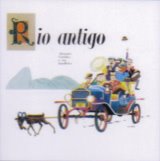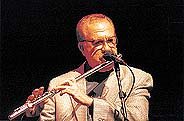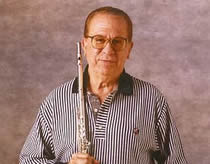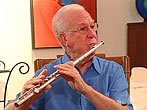
Clique aqui para baixar o disco/Download the album
........................................................
 Depois de tocar tarol na banda Lira de Árion, começou a estudar flauta. Iniciou a carreira nos programas de calouros, tendo obtido o primeiro prêmio no Calouros em Desfile, de Ary Barroso. Fez fama como improvisador e participou de numerosos grupos, discos e shows. Em 1949 gravou seu primeiro choro, "Flauteando na Chacrinha", no ano seguinte montou seu próprio conjunto na Rádio Guanabara. Em 51 substituiu Benedito Lacerda no conjunto regional de Garoto, contratado pela Rádio Mayrink Veiga. Lá acompanhou grandes estrelas como Vicente Celestino, Orlando Silva e Francisco Alves.
Depois de tocar tarol na banda Lira de Árion, começou a estudar flauta. Iniciou a carreira nos programas de calouros, tendo obtido o primeiro prêmio no Calouros em Desfile, de Ary Barroso. Fez fama como improvisador e participou de numerosos grupos, discos e shows. Em 1949 gravou seu primeiro choro, "Flauteando na Chacrinha", no ano seguinte montou seu próprio conjunto na Rádio Guanabara. Em 51 substituiu Benedito Lacerda no conjunto regional de Garoto, contratado pela Rádio Mayrink Veiga. Lá acompanhou grandes estrelas como Vicente Celestino, Orlando Silva e Francisco Alves. Formou o grupo Altamiro e Sua Bandinha, que teve programa na TV Tupi e emplacou o sucesso "Rio Antigo", com mais de 700 mil cópias vendidas. Nos anos 60 excursionou fora do país, e na década seguinte passou a ser um dos flautistas mais requisitados, por conta do movimento de redescoberta do choro. Continua em atividade, participando de gravações e shows, privilegiando o choro.
************************
 One of the most important choro flutists ever, Altamiro Carrilho put together a solid virtuosity and an ease for improvisation that in his 58 years as a professional artist (completed in 2001, having recorded over 110 albums) brought him the praise of both classical and popular renowned musicians, along with a consolidated popularity. His trademark was the insertion of excerpts of classical pieces into choro, and vice versa, as he did in the cadenza of the Concerto #2 in D Major KV 314 ahead of the Orquestra Sinfônica de Porto Alegre (1976). As an accompanist, he worked with Orlando Silva, Vicente Celestino, Elizeth Cardoso, Moreira da Silva, Francisco Alves, Sílvio Caldas, Caetano Veloso, and Chico Buarque, among many others. His maxixe "Rio Antigo" sold 960,000 copies in just six months back in 1956, bringing him national fame. Carrilho also presented the highly successful TV show Em Tempo de Música, and toured through many countries, having being praised as one of the world's best soloists by conductor Boris Trisno. As a classical music soloist, he played lead on several orchestra pieces like Mozart's Concert in G at the Teatro Municipal do Rio de Janeiro (1972). His album Clássicos em Choro was awarded with the Villa-Lobos trophy as Best Instrumental Album, and his Clássicos em Choro No. 2 won the gold record. In 1993, he was awarded with the Prêmio Sharp as the Best Arranger of Instrumental Music for his work on the album Altamiro Carrilho — 50 Anos de Choro, and, in 1997, he won it again for the Best Instrumental Album, Flauta Maravilhosa.
One of the most important choro flutists ever, Altamiro Carrilho put together a solid virtuosity and an ease for improvisation that in his 58 years as a professional artist (completed in 2001, having recorded over 110 albums) brought him the praise of both classical and popular renowned musicians, along with a consolidated popularity. His trademark was the insertion of excerpts of classical pieces into choro, and vice versa, as he did in the cadenza of the Concerto #2 in D Major KV 314 ahead of the Orquestra Sinfônica de Porto Alegre (1976). As an accompanist, he worked with Orlando Silva, Vicente Celestino, Elizeth Cardoso, Moreira da Silva, Francisco Alves, Sílvio Caldas, Caetano Veloso, and Chico Buarque, among many others. His maxixe "Rio Antigo" sold 960,000 copies in just six months back in 1956, bringing him national fame. Carrilho also presented the highly successful TV show Em Tempo de Música, and toured through many countries, having being praised as one of the world's best soloists by conductor Boris Trisno. As a classical music soloist, he played lead on several orchestra pieces like Mozart's Concert in G at the Teatro Municipal do Rio de Janeiro (1972). His album Clássicos em Choro was awarded with the Villa-Lobos trophy as Best Instrumental Album, and his Clássicos em Choro No. 2 won the gold record. In 1993, he was awarded with the Prêmio Sharp as the Best Arranger of Instrumental Music for his work on the album Altamiro Carrilho — 50 Anos de Choro, and, in 1997, he won it again for the Best Instrumental Album, Flauta Maravilhosa. Having four generations of musicians and conductors in his genealogical tree, becoming a flutist at age five was somewhat natural for Carrilho. Since he was nine, he had started working because of his father's illness, but he continued to study music at night. At 11, he joined the Banda Lira de Arion playing the snare drum. When he was 16, he moved to Niterói (Rio de Janeiro) and became a regular at the radio shows presented by Dante Santoro and Benedito Lacerda. During that period, he won first place in Ary Barroso's novice show. His improvisational skills soon brought him invitations to join the groups led by César Moreno, Canhoto, and Rogério Guimarães. He recorded for the first time in 1943, on a Moreira da Silva album. His first record as a solo artist was recorded six years later, with his choro "Flauteando na Chacrinha." His own regional (small group) was formed in 1950 to work at the Rádio Guanabara. In May 1951, he joined the Regional do Canhoto, replacing Benedito Lacerda. Working at the Rádio Mayrink Veiga, the group accompanied the biggest stars of that period, like Orlando Silva, Vicente Celestino, Moreira da Silva, Francisco Alves, and Sílvio Caldas. In 1955, he formed the Bandinha de Altamiro Carrilho, and, in the next year, he achieved national success with his maxixe "Rio Antigo." Through the TV Tupi show Em Tempo de Música, he and his Bandinha attracted large audience levels for two years. In 1957, he was replaced by Carlos Poyares at the Regional do Canhoto. From 1963 to 1969, he did several international tours through countries like Spain, Portugal, France, England (where he recorded programs for the BBC and NBC), Germany, Lebanon, Egypt, and the former U.S.S.R. (for a three-month season in which he was praised by the conductor Boris Trisno as one of the world's greatest soloists). Carrilho continues to perform and record, and was decorated in 1998 by the President Fernando Henrique Cardoso for his services to the country.
Having four generations of musicians and conductors in his genealogical tree, becoming a flutist at age five was somewhat natural for Carrilho. Since he was nine, he had started working because of his father's illness, but he continued to study music at night. At 11, he joined the Banda Lira de Arion playing the snare drum. When he was 16, he moved to Niterói (Rio de Janeiro) and became a regular at the radio shows presented by Dante Santoro and Benedito Lacerda. During that period, he won first place in Ary Barroso's novice show. His improvisational skills soon brought him invitations to join the groups led by César Moreno, Canhoto, and Rogério Guimarães. He recorded for the first time in 1943, on a Moreira da Silva album. His first record as a solo artist was recorded six years later, with his choro "Flauteando na Chacrinha." His own regional (small group) was formed in 1950 to work at the Rádio Guanabara. In May 1951, he joined the Regional do Canhoto, replacing Benedito Lacerda. Working at the Rádio Mayrink Veiga, the group accompanied the biggest stars of that period, like Orlando Silva, Vicente Celestino, Moreira da Silva, Francisco Alves, and Sílvio Caldas. In 1955, he formed the Bandinha de Altamiro Carrilho, and, in the next year, he achieved national success with his maxixe "Rio Antigo." Through the TV Tupi show Em Tempo de Música, he and his Bandinha attracted large audience levels for two years. In 1957, he was replaced by Carlos Poyares at the Regional do Canhoto. From 1963 to 1969, he did several international tours through countries like Spain, Portugal, France, England (where he recorded programs for the BBC and NBC), Germany, Lebanon, Egypt, and the former U.S.S.R. (for a three-month season in which he was praised by the conductor Boris Trisno as one of the world's greatest soloists). Carrilho continues to perform and record, and was decorated in 1998 by the President Fernando Henrique Cardoso for his services to the country.
 Br-Instrumental no Twitter
Br-Instrumental no Twitter





8 comentários:
Lindo post!!! Fantástico! Estou linkando o seu blog no meu: http://bossa-brasileira.blogspot.com/
Um grande abraço e parabéns.
Seu site esta de parabéns!!
amei o cd do Altamiro Carrilho!!
Um bom fds
abraços
Ótimo disco e parabéns pelo site!
Felicitaciones por tan excelente site!
No hay pérdida!
Gonzalo
Caracas,Venezuela
Muito obrigado por este CD.
Feliz 2009
Abraços
Raul
Não consegui baixar. Poderia consertar o link? Obrigado e parabéns pelo site. Nota mil!
Tenho este disco no fundo de meu Baú assim que tiver tempo vou digitaliza-lo e colocarei o link dele para todos baixarem.
Até Breve.
Tenho esse vinil,remasterizei,aqui está o link para todos que quizerem baixar:
http://www.mediafire.com/download/63ttc3l78eu68hk/Altamiro+Carrilho+e+sua+Bandinha+-+Rio+Antigo+%28Raridade+Aproveitem%29.rar
Postar um comentário